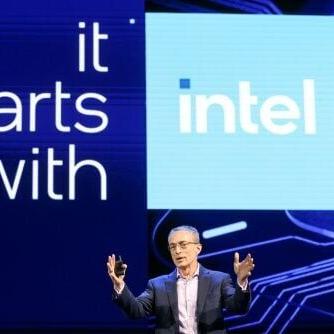Intel unveils new chip tech in AI battle with Nvidia, AMD – The Daily Courier
Please log in, or sign up for a new account and purchase a subscription to continue reading.
We have used your information to see if you have a subscription with us, but did not find one. Please use the button below to verify an existing account or to purchase a new subscription.
Your current subscription does not provide access to this content. Please use the button below to manage your account.
Please log in, or sign up for a new account and purchase a subscription to continue reading.
Please purchase a subscription to continue reading.
Your current subscription does not provide access to this content.
Sorry, no promotional deals were found matching that code.
Promotional Rates were found for your code.
Sorry, an error occurred.
do not remove
Cloudy skies this morning followed by scattered showers and thunderstorms during the afternoon. High 84F. Winds SW at 10 to 15 mph. Chance of rain 40%..
Partly cloudy skies. Low 64F. Winds W at 5 to 10 mph.
Updated: June 6, 2024 @ 6:19 am
CEO Patrick Gelsinger discussed Intel’s latest technologies during a keynote speech at Computex in Taiwan
Computex is the top annual tech showcase in Taiwan
CEO Patrick Gelsinger discussed Intel’s latest technologies during a keynote speech at Computex in Taiwan
Computex is the top annual tech showcase in Taiwan
US chip titan Intel on Tuesday struck a defiant tone in the face of strong challenges from rivals Nvidia, AMD and Qualcomm, unveiling technologies it said would lead the artificial intelligence revolution.
For decades, Intel has dominated the market for the chips that run everything from laptops to data centres. But in recent years, its competitors, especially Nvidia, have soared ahead on specialised AI processors.
During a keynote speech at Taiwan’s Computex expo, CEO Pat Gelsinger introduced Intel’s latest Xeon 6 processors for servers, and shared more details about its next-gen Lunar Lake chips for AI PCs.
“AI is driving one of the most consequential eras of innovation the industry has ever seen,” Gelsinger said.
“The magic of silicon is once again enabling exponential advancements in computing that will push the boundaries of human potential and power the global economy for years to come.”
Gelsinger said Intel’s latest equipment provides the best available mix of performance, energy efficiency and affordability.
Intel’s Gaudi systems — used for advanced AI work such as training models — come at a third of the cost of what competitors offer, he claimed.
Gelsinger’s presentation followed earlier keynote speeches by Nvidia boss Jensen Huang, AMD CEO Lisa Su and Qualcomm’s Cristiano Amon — and they were replete with claims and counterclaims about which firm’s products were best for AI.
Su and Amon gave detailed presentations on the chips their companies have developed for AI-enhanced personal computers.
Microsoft this month unveiled its Copilot+ AI PCs, which will have artificial intelligence features built into its Windows operating system.
Along with Microsoft, these will be offered by some of the world’s biggest manufacturers, including Dell, HP, Samsung and Lenovo, and will have AI features on the device and not just through the internet.
Gelsinger in particular rejected Qualcomm’s claim that its AI PC chips were better than Intel’s.
“I just want to put that to bed right now,” he said. “Ain’t true!”
AI computers are expected to be 80 percent of the PC market by 2028, Intel said, citing the Boston Consulting Group.
Computex is the top annual tech showcase in Taiwan, whose semiconductor industry is crucial to the production of everything from iPhones to the servers that run ChatGPT.
With the world’s leading tech firms betting big on AI, Taiwanese manufacturers have emerged as central players in those plans.
The island produces the bulk of the world’s most advanced semiconductors, including those needed for the most powerful AI applications and research.
Taiwan’s government wants to use these capabilities to accelerate the widespread use of AI.
“We have a lot to do to build Taiwan into an AI smart island,” President Lai Ching-te, who took office last month, said during a visit to Computex on Tuesday.
However, Taiwan’s central position in the supply chain for semiconductors — the lifeblood of the modern economy — has become a source of concern in capitals and boardrooms around the world.
Taiwan is self-ruled, but China claims the island as its territory and has said it would never renounce the use of force to bring it under its control.
In recent years, the relationship between Beijing and Taipei has deteriorated and the Chinese military has staged multiple large-scale exercises around the island.
bur-qan/dhc/ser
Originally published on doc.afp.com, part of the BLOX Digital Content Exchange.
Sorry, there are no recent results for popular commented articles.
Your browser is out of date and potentially vulnerable to security risks.
We recommend switching to one of the following browsers:

